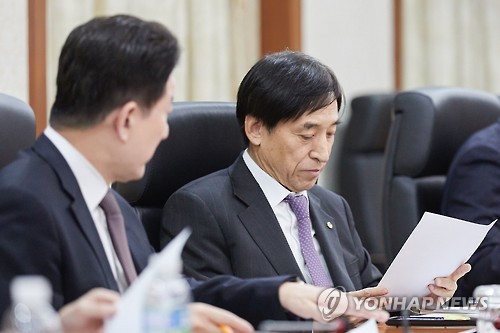Bank of Korea (BOK) Governor Lee Ju-yeol on Saturday called for close monitoring of the financial and currency markets as the U.S. Federal Reserve is highly likely to raise key rates at its policy meeting next week.
"There is a very high possibility the Fed will increase its interest rates this month as the employment index announced overnight showed sound results," he said during a meeting with senior officials.
The meeting came one day after the Constitutional Court removed President Park Geun-hye from office over a massive corruption scandal.
The central bank said in a statement that the economy is facing growing external uncertainties including U.S. rate increases, the rise of trade protectionism and China's economic retaliation over the deployment of a U.S. missile defense system in South Korea.
The BOK noted that global investment banks believe the Constitutional Court's decision on Friday to sack the president will ease political uncertainties in South Korea.
They also expected increased fiscal spending under a new government to support growth will buoy investor sentiment, the central bank said.

On Friday, the markets were not affected by the unprecedented decision. The benchmark Korea Composite Stock Price Index gained 0.3 percent to 2,097.35. The won gained 0.4 percent against the dollar at 1,155.50.
Given this, the government is expected to maintain its current growth forecast of 2.6 percent for the year. South Korea's economy grew 2.7 percent in 2016.
Weighing on Asia's fourth-biggest economy, the U.S. Federal Reserve is widely expected to raise interest rates on March 14-15 (U.S. time) on robust jobs data for the first two months of this year. U.S. employers added 235,000 jobs in February.
The Fed raised the cost of borrowing by 0.25 percent to a range of between 0.5 percent and 0.75 percent.
The BOK kept interest rates unchanged at 1.25 percent for an eighth straight month in February, opting to support growth amid uncertainties.
Moreover, the Donald Trump administration has said Seoul and Washington need to review their bilateral free trade agreement and improve it through renegotiation.
Economic sanctions from China are another headache for the country heavily dependent on exports, especially to the neighboring country. China has explicitly opposed the deployment of an advanced U.S. missile defense system known as THAAD in South Korea due to security reasons.
In recent months, travel demand from China and demand for South Korean products in China have fallen sharply as Seoul and Washington are pushing to complete the THAAD installment as early as April. (Yonhap)

